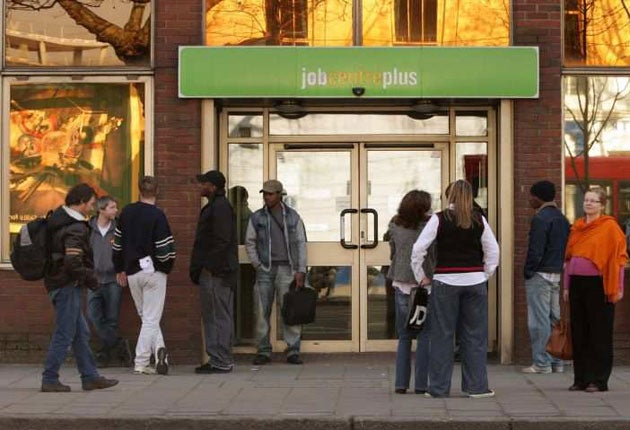Unemployment total down by 35,000: First fall for a year

Unemployment has fallen for the first time in almost a year, but the number of women out of work has risen to its highest level since 1987.
The jobless total fell by 35,000 in the quarter to February, to 2.65 million, a rate of 8.3%, while jobseeker's allowance claimants increased for the 17th month in a row in March, up by 3,600 to 1.61 million, the smallest monthly rise since last December.
The Government said the figures were a "step in the right direction", pointing out that employment grew by 53,000 to 29 million.
Other figures from the Office for National Statistics revealed that the number of unemployed women increased by 8,000 in the latest quarter to 1.14 million, the highest figure for almost 25 years, and the number of people out of work for over a year jumped by 26,000 to 883,000, the worst total since 1996.
The figures also showed an 89,000 rise in the number of people working part-time because they could not find full-time jobs, to a total of 1.4 million, the highest figure since records began in 1992.
Employment minister Chris Grayling said: "Today's figures are a step in the right direction but we still have a long way to go.
"We are pushing ahead with our strategy to promote investment and new jobs in the private sector and support people currently without work to take up those jobs.
"I am particularly encouraged that overall employment is now growing despite reductions in the public sector.
"There are still economic challenges ahead and the Government is reacting by helping people to find employment through initiatives with the private sector at their heart."
Dr John Philpott, chief economic adviser at the Chartered Institute of Personnel and Development, said: "With the number of women in work at best flat-lining, and many men and women unable to find full-time jobs, it would be unwise to get too excited by a welcome fall in unemployment.
"A properly recovering jobs market is not characterised by a growing army of underemployed part-timers and pay rises still falling well short of price inflation."
Neil Bentley, deputy director general of the CBI, said: "While this is the best jobs news we've had in a year, the Government must step up its welfare reform programme.
"Worryingly, over a third of those unemployed have been out of work for more than 12 months.
"With youth jobless numbers still stubbornly high, helping young people find jobs must remain a joint priority for businesses and Government."
Shadow work and pensions secretary Liam Byrne said: "We've had two years of excuses and now we've got the evidence - this Government has utterly failed to tackle Britain's jobs emergency, and we are limping along in crisis.
"The number of people signing on is going up, we still have more than a million young people out of work, more women unemployed than since 1987 and a benefits bill that is spiralling by the day."
TUC general secretary Brendan Barber said: "This long-overdue fall in unemployment will bring relief to the 2.6 million people desperately looking for work.
"While any rise in the number of jobs is welcome, the fact is that full-time employment is still falling and a record 1.4 million are now stuck in involuntary part-time work.
"There's also a sting in the tail for those in work, with wages falling even faster than feared due to low pay growth and stubbornly high inflation."
There were 1.03 million unemployed 16-to-24-year-olds, down by 9,000 from the three months to November and the lowest total since last autumn.
Average earnings increased by 1.1% in the year to February, down by 0.2 percentage points from the previous month to the lowest since the summer of 2010.
Average weekly pay in private firms is £459, compared with £477 in the public sector.
There were 1.4 million working days lost through strikes in the year to February, the highest total since 2002, largely as a result of last November's walkout by public sector workers in the row over pensions.
PA
Subscribe to Independent Premium to bookmark this article
Want to bookmark your favourite articles and stories to read or reference later? Start your Independent Premium subscription today.

Join our commenting forum
Join thought-provoking conversations, follow other Independent readers and see their replies